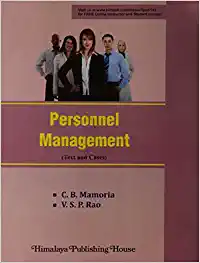If you are an organized individual who enjoys helping others, a career in personnel management could be great for you. Personnel managers work as administrative human resource professionals to help develop and manage employees within an organization. Learning more about this role could help you determine if it’s the right path for you.
Who is Personal Manager
Personnel managers are administrative professionals who oversee the hiring process and professional development of employees within an organization. Many companies include personnel professionals as part of a larger human resources team, but smaller organizations may have an individual personnel manager performing all the administrative duties
Personal Management is, Personal Management
Personnel management is an administrative function within an organization that oversees the hiring, organization and support of employee positions. A branch of human resources, personnel management focuses on recruiting the right individuals to fit a position and supporting those already working for the company. This area also functions as a tool for evaluating the hiring process and gaining insight into employee satisfaction. Personnel management professionals work to provide the resources and tools staff members need to thrive in their work environment every day.
The Role of Personal Manager is, Personal Manager Role, Personal Manager Duties
Personnel managers oversee the clerical and administrative duties within an organization. This can vary depending on the company size and industry. Common responsibilities can include:
- Recruiting new employees by researching the needs of various departments and creating job listings
- Interviewing candidates or conducting an initial screening for various postings within a company
- Hiring new staff and completing necessary paperwork
- Leading onboarding training for new employees
- Negotiating salary and pay information with new and current employees
- Collaborating with other management members to create employee handbooks and company policies
- Filing important documents such as benefits and tax information
- Organizing information using software programs or a filing system
- Assisting employees with any issues involve payroll, benefits or management
- Overseeing the payroll process and ensuring timely payments
- Acting as a counselor or mediator to resolve conflict
- Planning or leading trainings related to professional and personal development
- Conducting performance reviews or evaluations
- Approving personal time off requests and creating company schedules
- Overseeing employee departures and conducting exit interviews
Personal Manager
Grievance Handling Comes under which role of the Personal Manager
Personnel managers serve an important role in developing a team of professionals. They help find new talent, train new employees and support them as necessary during their careers. Successful personnel managers can work to increase retention as they foster poster work interactions and solve conflicts. They can also help increase productivity as they recruit highly trained professionals.
Personal Manager Should have a and faith in Humanity
Personnel managers are also an important aspect of a company’s organization. They collect and store employee data, and they help make sure employees receive timely paychecks. They answer questions and assist with benefit programs. They can work to help an organization run efficiently.
Personal Manager Job Description
In order to succeed in their roles, personnel managers use a specific skill set. This can vary depending on the size of the organization and the industry, but helpful skills can include:
- Organization: Personnel managers need to file and organize important employee records, including payroll, tax and benefits information.
- Communication: To succeed, personnel managers use strong communication skills. They must have excellent verbal and non-verbal skills to explain new concepts, conduct interviews and discuss company policies.
- Scheduling: Personnel managers may create company schedules. Depending on the size of the company, they may organize and approve time off requests. They may also plan events, interviews and trainings.
- Compassion: Personnel managers may foster relationships and build connections with a team of staff. They help connect employees with upper management and support professionals during their careers. Compassion and empathy can help them build these important relationships.
- Delegation: Depending on the size of the company, personnel managers may work independently or supervise a team. They may need to delegate or divide task to ensure efficiency.
- Collaboration: Personnel managers may work closely with other human resource team members. For example, they may communicate and collaborate with a benefits plan administrator when helping new employees.
- Conflict resolution: Occasionally, personnel managers act as mediators to resolve workplace issues. Strong conflict resolution skills can help them reach productive solutions quickly and efficiently.
- Instructional skills: Personnel managers train new employees and lead instructional development programs for current staff. Instructional experience and training skills can help them convey information effectively.
- Computer skills: Depending on the company and industry personnel managers may need strong computer skills. They may use software programs to track employees’ payroll and benefits.
To Read more such informative Blogs Click Here
hradvosrs4u Blogs
HRM differs from Personal management both in and
Personnel managers and human resource managers are similar roles with a few important differences. Personnel roles have existed longer than human resource positions. Many companies have taken the personnel manager role and added additional responsibilities to create the human resource manager role. Typically, a company will have either a personnel manager or a human resource manager as many of the duties overlap.
The following are the major differences between Personnel Management and Human Resource Management:
- The part of management that deals with the workforce within the enterprise is known as Personnel Management. The branch of management, which focuses on the best possible use of the enterprise’s manpower is known as Human Resource Management.
- Personnel Management treats workers as tools or machines whereas Human Resource Management treats it as an important asset of the organization.
- Human Resource Management is the advanced version of Personnel Management.
- Decision Making is slow in Personnel Management, but the same is comparatively fast in Human Resource Management.
- In Personnel Management there is a piecemeal distribution of initiatives. However, integrated distribution of initiatives is there in Human Resource Management.
- In Personnel Management, the basis of job design is the division of work while, in the case of Human Resource Management, employees are divided into groups or teams for performing any task.
- In PM, the negotiations are based on collective bargaining with the union leader. Conversely, in HRM, there is no need for collective bargaining as individual contracts exist with each employee.
- In PM, the pay is based on job evaluation. Unlike HRM, where the basis of pay is performance evaluation.
- Personnel management primarily focuses on ordinary activities, such as employee hiring, remunerating, training, and harmony. On the contrary, human resource management focuses on treating employees as valued assets, which are to be valued, used and preserved.
The scope of Personal Management includes
Personnel management can be broken down into several elements as listed below:
- Job analysis: This function of personnel management determines how a position fits into the overall company framework. It’s a measure of the role and not the employee.
- Strategic personnel planning: Also called strategic workforce planning, this element involves hiring the most qualified individual to fit a necessary role in an organization. It ensures that hiring processes are consistent, fair and effective.
- Performance appraisals: Identifying how employees are evaluated is the function of this element of personnel management. Using this element, professionals in personnel management decide how often employees are assessed and the methods used to rate employee performance.
- Benefit coordination: Determining the type of benefits employees receive and planning for their distribution is an essential part of personnel management. This element also involves choosing plans such as personal health care benefits.
- Continuing education: To keep staff involved in growing their career and investing in their workplace, personnel management oversees employee development through continuing education. This may include offering seminars, learning lunches or arranging for staff to attend professional conferences.
- Pay and salary distribution: Another part of the operational activities of personnel management staff is to ensure employee payroll functions correctly. It may also involve setting pay scales or job levels.
- Attendance and leave: Managing personnel also means overseeing time off for sick and personal days. This function also involves leaves of absence or short-term disability.
Personal Manager Salary
Based on Ambisionbox Survey: Personal Manager salary in India ranges between ₹ 2.4 Lakhs to ₹ 7.2 Lakhs with an average annual salary of ₹ 4.0 Lakhs. Salary estimates are based on 32 salaries received from Personal Managers.
How to be a Personal Manager

ONTENTS : 1. Nature of Personnel Management 2. Personnel Management: Functions, Roles and Challenges 3. Personnel Policies, Procedures and Programmes 4. Growth, Philosophy and Principles 5. The Strategic Role of HRM in 21st Century 6. Personnel Management in India 7. Job Analysis 8. Human Resource Planning 9. Recruitment 10. Selection & Many Others



Add a Comment